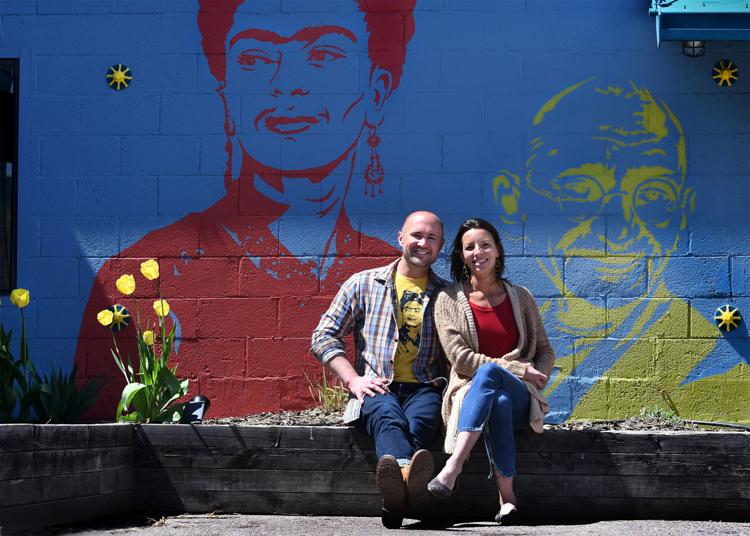
The reason the owners of a microbrewery are winning the annual Jeannette Rankin Peace Center Peace Award stretches back years and into another country.
Robert Rivers and Fernanda Menna Barreto Krum were visiting Krum's native Brazil and thinking of transitions to new careers after a collective 20 years of working in conflict zones.
Rivers, a Helena native, is a peace-building specialist, and Krum is a trauma psychologist. Both were on the ground level on "processes that revolve around civilian peace-keeping, community peace-building and trauma healing for people affected by violence and war," Rivers said.
They worked with groups like the U.N.'s Office for the Prevention of Genocide, Doctors Without Borders, Doctors of the World, Nonviolent Peaceforce, and Crisis Management Initiative.
After so many years, they felt the effects of post-traumatic stress disorder and wanted a more sustainable way to live, while still making a difference.
They were discussing how to start an education center — and to fund it — at a bar in Brazil.
"All the Brazilians were connecting over beer, and we thought, 'What could we do to sustain an educational center?' and we looked around the room and thought, 'Beer,'" he said.
That idea led to the creation of Imagine Nation Brewing, their 4-year-old business that's billed as "the country's first combination brewery and center for positive change."
They've hosted around 400 different organizations and around 3,000 community events at their taproom (with a separate meeting room). On average, they give more than 25 percent of their net profit back to the community. The groups range from Soft Landing Missoula, Climate Smart Missoula, Community Food and Agriculture Coalition, KBGA College Radio, and Moms Demand Action.
Krum said their skills helped in developing their concept, which is new to Missoula, and finding partners and supporters.
"We applied what we knew worked when we worked in conflict zones, which is networking with stakeholders and people that we knew that if we got their support and got their attention to the project, that it was more likely it would be successful or that we would get to the next person we needed to connect with to make this successful," she said.
They said the only criteria they ask of groups is that their meetings are nonpartisan, i.e. not actively working against others, and that their goal is "leaving the world a slightly better place," according to Rivers.
Community heroes
The Peace Center's executive director, Betsy Mulligan-Dague, said the couple's work abroad, and their ability to bring those skills back to Missoula and host conversations and dialogue, sometimes between opposing sides about crucial issues, made them a fit for the award.
She compared the honor to a "buy local" campaign. "We all look at heroes as big, national or international names, and the Peace Center for 33 years has honored someone locally that is a hero in our community." The award is also bestowed by the Missoula Peace Quilters.
Some prior recipients include Dan Gallagher, an advocate for veterans; and Mary Poole, the co-founder of Soft Landing Missoula, which has helped refugees settle in the Garden City. Dague said the winners are all very different people with different gifts and causes, but "all of them have modeled or taught us some way of being that helps us see what peace might look like."
At the ceremony on Saturday (see box), they'll also honor five Young Peacemakers up for the Father Jim Hogan Peace Award, and announce the winners. (This year there are two.)
'Everybody loves beer'
Before opening the brewery, the couple met with people from the West Broadway neighborhood, and the Poverello Center across the street, to hear any concerns about having a brewery in the area. The Missoula Redevelopment Agency helped them purchase the building, a transaction that included making half of their large parking lot public.
They also raised around $115,000 online and offline from people in Missoula and Helena.
They see beer as the point of accessibility to bring people together, and so they spend extra money on good ingredients.
"We've been told by groups in town (that) the groups that are the hardest to talk to are the ones that don't think like us," Rivers said, "and what you've done is create a space where all walks of life, and the entire political spectrum comes, because everybody loves beer. So it's become an entry point that's bigger than itself," he said.
Rivers said they don't have ambitions of statewide, or nationwide expansion, for their beer.
"The temptation is to get sucked into this unending model of growth, which ultimately is not realistic nor is it sustainable. So I think we would like to expand slightly, but the goal is that the taproom is always the nexus of where we do most of our business and where we put our intention because we like to see people sitting across from each other, having a beer and talking about life. That's why we don't have any TVs in the room," he said.
Citing the staggering amount time most people spend in front of screens, he said their goal is create a space where people talk to each other.
"How are things going to change in our community if we're just sitting, and perhaps hiding behind screens? Ultimately what we need to do may sound old-fashioned, but we need to sit in front of each other. We need to look each other in the eye. We need to share something together, this common humanity we all have, and I think from that base, amazing things are possible," he said.
